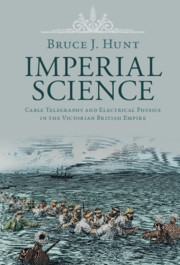Book contents
- Imperial Science
- Science in History
- Imperial Science
- Copyright page
- Contents
- Figures
- Acknowledgments
- Abbreviations
- Prologue: “An Imperial Science”
- 1 “An Ill-Understood Effect of Induction”
- 2 Wildman Whitehouse, William Thomson, and the First Atlantic Cable
- 3 Redeeming Failure
- 4 Units and Standards
- 5 The Ohm, the Speed of Light, and Maxwell’s Theory of the Electromagnetic Field
- 6 To Rule the Waves
- Epilogue Full Circle
- Bibliography
- Index
3 - Redeeming Failure
The Joint Committee Investigation
Published online by Cambridge University Press: 11 December 2020
- Imperial Science
- Science in History
- Imperial Science
- Copyright page
- Contents
- Figures
- Acknowledgments
- Abbreviations
- Prologue: “An Imperial Science”
- 1 “An Ill-Understood Effect of Induction”
- 2 Wildman Whitehouse, William Thomson, and the First Atlantic Cable
- 3 Redeeming Failure
- 4 Units and Standards
- 5 The Ohm, the Speed of Light, and Maxwell’s Theory of the Electromagnetic Field
- 6 To Rule the Waves
- Epilogue Full Circle
- Bibliography
- Index
Summary
After the failure of the first Atlantic cable, proponents of oceanic submarine telegraphy sought to parry claims that the task they had attempted was simply impossible and to argue that it instead resulted from a series of correctable errors. Their first step was to pin as much blame as they could on Wildman Whitehouse while separating his practices from those of proper electrical scientists and engineers. The Atlantic Telegraph Company then teamed with the British government to establish a Joint Committee to investigate how such disasters might be avoided in the future. In 1861 the committee issued a massive Report that identified the rationalization of methods and standardization of materials as keys to bringing order and reliability to an industry that had hitherto lacked both. The Joint Committee Report exemplified the power of expertise backed by official authority, and it soon became the bible of British cable practice as the idiosyncratic methods of Whitehouse and other cable amateurs gave way to William Thomson and Latimer Clark’s emphasis on precise and standardized measurement. Guided by this new measurement-based approach to telegraph engineering, the Atlantic cable project was resurrected and would finally succeed in 1866.
Keywords
- Type
- Chapter
- Information
- Imperial ScienceCable Telegraphy and Electrical Physics in the Victorian British Empire, pp. 97 - 143Publisher: Cambridge University PressPrint publication year: 2021

